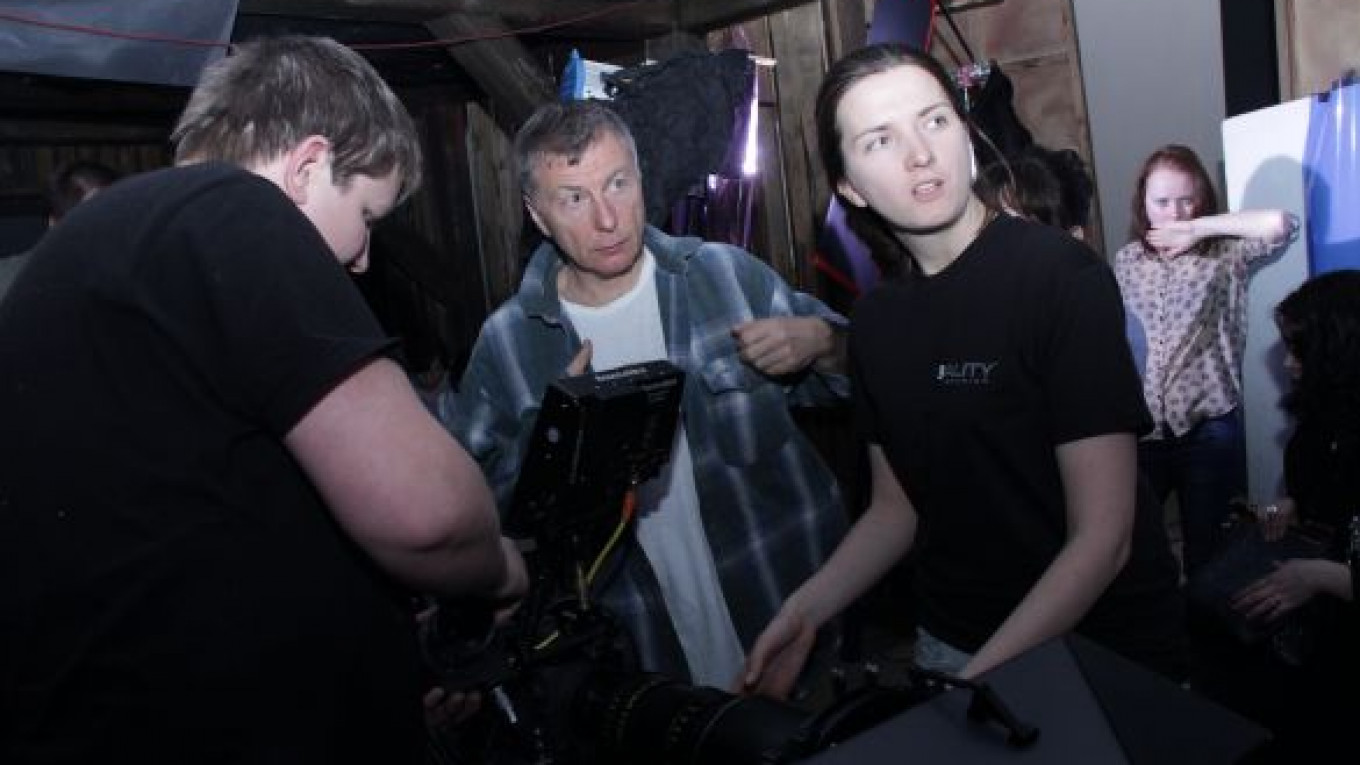On a hushed set, deep within Russia's most venerable film university, the Russian State University of Cinematography named after S. Gerasimov (VGIK), rector and film director Milcho Manchevski and more than 60 students have embarked upon a six-week intensive shoot.
Their assignment: to re-imagine short scenes from five classic films. Initial casting and planning began with the director's first visit in October and was swiftly followed by six months of planning and correspondence, prior to the actual shooting.
Manchevski was both the writer and director of award-winning feature films, such as "Before the Rain" (1994) and pioneering documentary-drama hybrid "Mothers" (2011).
Nowadays, he is head of directing studies at NYU's Tisch School of the Arts Graduate Film program, with his artistic work extending across many forms of media, spanning film and writing to performance art. His most recent photography exhibition, "Five Drops of Dream," is to open in Moscow's Solyanka gallery toward the end of the month.
The project is funded in part by the U.S. Department of State, and is a direct product of the U.S.-Russia Bilateral Presidential Commission formed in 2009. It was actor and professor Igor Yasulovich who proposed inviting Manchevski to VGIK to lead a program in film acting.
Manchevski gladly accepted.
"I've been hearing about the legend of VGIK for years," he said in a press conference at RIA-Novosti earlier in April. "I wanted to see it first hand."
The program comes at a critical moment for VGIK, as director Vladimir Malyshev explained. "We were founded as the first film school in the world in 1919, and our education was considered the model for decades, beginning with Eisenstein, Kuleshov, etc, etc. But now cinema [in Russia] is run by producers."
When Malyshev left VGIK in 1975, graduation was not the end of a filmmaker's formative years. "They were supposed to arrange a position for each person at a studio, and at the studio we received yet another education in our film crews," he remembered.
Present-day producers now demand that film schools deliver ready-made specialists with experience on the latest film equipment. "In general, no one gives time for a person to enter into the profession," Malyshev said.
The problem became clear to fourth-year cinematography student Anna Yevstratova during her work with Manchevski. "I lack the skills to operate the camera," she said. "We have so much theory discussed in class and so much philosophy, but at the same time we lack hands-on craftsmanship."
In this sense, Manchevski comes as a representative of the American film education system. "There is much more emphasis on the hands-on in America film schools," he told reporters, adding that this can have its own drawbacks for students who do not educate themselves independently.
Malyshev praised the program for giving students experience "that will be with them all their lives." "Certainly, we have to give more practice at VGIK," he said, adding that in his opinion VGIK continues to do well "as regards theory and our traditions for nurturing the creative personality."
In terms of his approach to teaching, he tries to emphasize the necessity for both the "craft" and the "heart" to coexist. "With the craft, there are things that you can lecture on, things that you can teach people…I often tell students that directing is like playing a piano, practice, practice, practice, direct every day," Manchevski said during a brief break from shooting.
"But all of that means nothing if you don't put your heart into it," he continued. "Everybody has to find their own heart, their own soul, their own subjects and emotions that they're interested in exploring in their work. I cannot do it for them, nobody can do it for them."
"There is a lot of pressure on filmmakers to make the films that their backers expect from them rather than the kind of the films that the filmmakers want to make. I try to say 'look at what you really want to do, and go for that.'"
Many of his students praised the atmosphere of order and creative autonomy they found on set. They also appreciated the seriousness with which Manchevski approached the project.
"Our segments are two, maybe three minutes long," set designer Maria Ponikarova said, "but they are so worked-through, so complete."
Actors reaffirmed reports of his conscientious approach: "I don't think he invested any less in our films than in his others. He gave just as much," actor Dmitry Grinevich insisted. "Thanks to this experience, I understand what real cinema is."
Manchevski is mutually appreciative of the young filmmakers. "Usually this level of knowledge and dedication I see from graduate students, not undergraduate students," he said.
Victoria Artyukhova, who played robber Sonny's wife, Angie, in their adaptation of Lumet's "Dog Day Afternoon," claims that she even discovered an "international language" in her work with Manchevski. "Most of the time when he told me something in English, I half understood without translation."
Manchevski smiled at this. "When you're dealing with art, you follow the emotion and the general concept. For me, the film that really works is the film that the viewer can understand without subtitles."
Contact the author at [email protected]
Related articles:
A Message from The Moscow Times:
Dear readers,
We are facing unprecedented challenges. Russia's Prosecutor General's Office has designated The Moscow Times as an "undesirable" organization, criminalizing our work and putting our staff at risk of prosecution. This follows our earlier unjust labeling as a "foreign agent."
These actions are direct attempts to silence independent journalism in Russia. The authorities claim our work "discredits the decisions of the Russian leadership." We see things differently: we strive to provide accurate, unbiased reporting on Russia.
We, the journalists of The Moscow Times, refuse to be silenced. But to continue our work, we need your help.
Your support, no matter how small, makes a world of difference. If you can, please support us monthly starting from just $2. It's quick to set up, and every contribution makes a significant impact.
By supporting The Moscow Times, you're defending open, independent journalism in the face of repression. Thank you for standing with us.
Remind me later.






